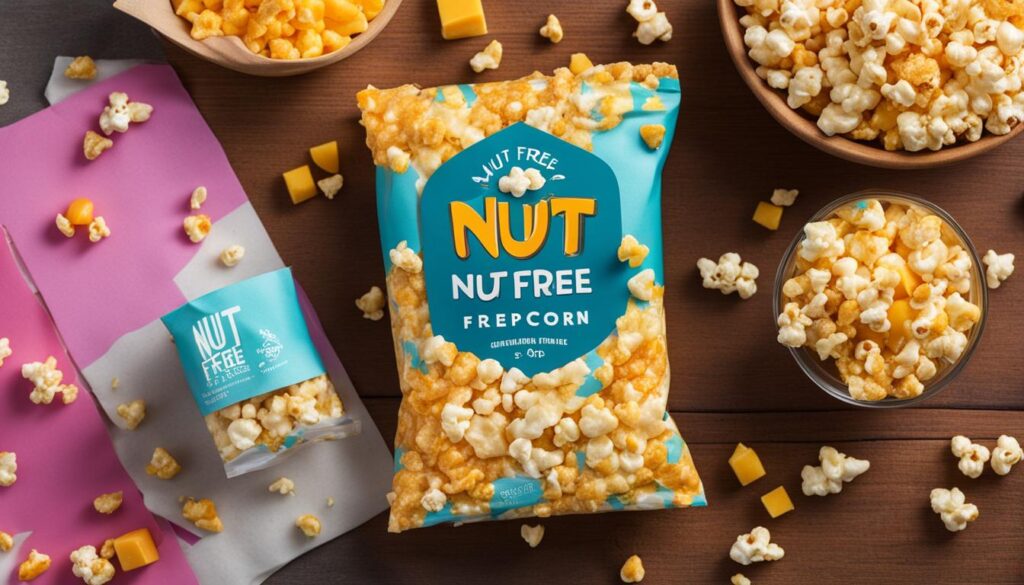Can you eat popcorn if you have a nut allergy? This is a common question for individuals with nut allergies who are looking for safe snack options. In this article, we will explore whether popcorn is safe for people with nut allergies and provide some helpful tips for enjoying popcorn without risking an allergic reaction.
Research shows that about two in every 100 people have a nut allergy. Popcorn, however, is not classified as a nut, but as a seed belonging to the cereal division of grains. This means that people with nut allergies can safely consume popcorn as long as it has not been contaminated with nuts. It is important to distinguish between tree nut allergies and peanut allergies, as they are different. Individuals with peanut allergies may not be allergic to tree nuts. Reading labels, asking for clarification, and checking for allergen warnings can help determine if popcorn is nut-free.
Key Takeaways:
- Popcorn is not a nut but a seed belonging to the cereal division of grains.
- Individuals with nut allergies can safely consume popcorn as long as it is not contaminated with nuts.
- Reading labels, asking for clarification, and checking for allergen warnings can help determine if popcorn is nut-free.
- It is important to distinguish between tree nut allergies and peanut allergies.
- There are several nut-free popcorn brands available in the market.
Differentiating Between Seeds, Grains, Nuts, and Cereals
When it comes to food classification, definitions can often be confusing. It’s important to understand the distinctions between seeds, grains, nuts, and cereals to better grasp where popcorn fits in.
Popcorn, contrary to popular belief, is not a nut. It is actually classified as a seed in the cereal division of grains. Seeds, such as popcorn, can develop into another plant under the right conditions. Grains, on the other hand, are small, hard, dry seeds that can be harvested and eaten by humans or animals. Cereals belong to the grass family and are grown primarily to produce grain.
In summary, popcorn is a type of seed – specifically, a cereal seed. It is not a nut or a grain. Understanding these distinctions helps clarify that popcorn is a safe choice for individuals with nut allergies.
Seeds:
- Popcorn
- Sunflower seeds
- Pumpkin seeds
Grains:
- Rice
- Wheat
- Oats
Nuts:
- Almonds
- Walnuts
- Peanuts
Cereals:
- Corn
- Rice
- Wheat
Reading Labels and Avoiding Contamination
When it comes to enjoying popcorn with a nut allergy, reading labels and avoiding contamination is crucial. While popcorn itself is not a nut, cross-contamination can occur during the manufacturing process, putting individuals with nut allergies at risk. To ensure your safety, follow these steps:
- Check the allergen facility information: Look for popcorn brands that clearly state they are manufactured in nut-free facilities. This reduces the chances of cross-contamination.
- Do a quick Google search: Before purchasing a popcorn brand, search online to see if there have been any reports or recalls related to nut contamination. This extra step can provide peace of mind.
- Read the ingredient list: Carefully examine the ingredient list for any mention of nuts or traces of nuts. Even small amounts can pose a risk.
- Look for allergen warnings: Pay attention to allergen warnings on the packaging. Manufacturers are required to disclose if the product may contain nuts or if it has been manufactured in a facility that processes nuts.
By following these guidelines, you can confidently enjoy popcorn without worrying about the presence of nuts or cross-contamination. Remember, it’s always better to be safe than sorry when it comes to managing a nut allergy.
Examples of Nut-Free Popcorn Brands

When it comes to finding safe and delicious popcorn options for individuals with nut allergies, there are several trusted brands available in the market. These brands have specific products that are peanut- and tree nut-free, making them suitable for people with nut allergies. Here are some examples of nut-free popcorn brands:
- Jolly Time: Jolly Time offers a range of popcorn products that are free from peanuts and tree nuts. Their popcorn is prepared using equipment that does not handle nuts, ensuring a safe snacking experience for individuals with nut allergies.
- Skinny Pop: Skinny Pop is another popular brand that produces nut-free popcorn. Their products are made with simple ingredients and are free from peanuts, tree nuts, and peanut oil.
- Lesser Evil: Lesser Evil is known for their organic and clean snacks, including nut-free popcorn options. Their popcorn is carefully crafted to be free from peanuts and tree nuts, providing a safe choice for those with nut allergies.
It is important to note that while these brands offer nut-free popcorn, it is always recommended to check the labels for any changes in ingredients or manufacturing processes, as this information may vary over time. Additionally, individual sensitivities and allergies can vary, so it is advisable to consult with a healthcare professional or allergist if you have any specific concerns or dietary restrictions due to nut allergies.
Enjoy Popcorn with Confidence
With the availability of these nut-free popcorn options, individuals with nut allergies can enjoy this crunchy and satisfying snack without worry. These brands prioritize allergen safety and provide a variety of flavors and textures to suit different preferences. Remember to always read the labels, check for any allergen warnings, and follow personalized dietary restrictions. By making informed choices and selecting nut-free popcorn brands, you can continue to savor the joy of popcorn, guilt-free.
Popcorn Allergies and Reactions

While popcorn is generally safe for individuals with nut allergies, it is important to note that some people may still be allergic to popcorn itself. Allergic reactions to popcorn can vary from mild to severe, and symptoms may manifest shortly after consumption or even a few hours later. Common symptoms of a popcorn allergy include nausea, tingling or itchy mouth, runny nose, hives, sneezing, breathing problems, and in severe cases, anaphylaxis.
If you suspect that you have a popcorn allergy, it is crucial to seek medical advice and undergo testing to confirm the allergy. Your healthcare provider can conduct tests such as skin prick tests or blood tests to determine your specific allergens. They will also provide you with personalized dietary restrictions and advice on managing your popcorn allergy.
Allergy Management Tips:
- Avoid consuming popcorn if you have been diagnosed with a popcorn allergy.
- Read ingredient labels carefully to identify popcorn in processed foods and snacks.
- Inform restaurant staff about your popcorn allergy to avoid cross-contamination.
- Carry an epinephrine auto-injector (EpiPen) at all times in case of a severe allergic reaction.
- Stay informed about the latest research and developments in managing popcorn allergies.
Checking for Peanut and Tree Nut Allergens in Popcorn Brands

When it comes to finding nut-free snacks, individuals with peanut and tree nut allergies must be cautious and diligent. Popcorn, being a popular and delicious option, can be a safe choice if precautions are taken. To ensure that popcorn brands are free from peanut and tree nut allergens, here are some steps to follow:
1. Identify the type of nut allergy
Understanding the specific type of nut allergy is essential as some individuals may only need to avoid certain nuts while others may need to avoid all types of nuts. Knowing the exact allergens to avoid will help in selecting the right popcorn brand.
2. Check the ingredient list
Thoroughly read the ingredient list of the chosen popcorn brand. Look for any mention of peanuts or tree nuts in the ingredients. If a particular nut is listed, it is best to choose a different brand that does not contain the allergen.
3. Look for allergen warnings
Manufacturers often include allergen warnings on their packaging to alert consumers about potential cross-contamination or the presence of nuts in their facilities. Watch out for statements like “May contain peanuts or tree nuts” or “Processed in a facility that also handles nuts.” If such warnings are present, it is advisable to opt for a different popcorn brand.
4. Read “may contain” warnings for cross-contamination
Some popcorn brands may explicitly mention the risk of cross-contamination with peanuts or tree nuts. These warnings are crucial for individuals with severe allergies. If a popcorn brand states that it “may contain” nuts, it’s safer to choose a different nut-free option.
By following these steps and being vigilant while checking for allergen information, individuals with peanut and tree nut allergies can enjoy popcorn without any worries. Always remember that each person’s allergy is unique, and it’s essential to consult with healthcare professionals for personalized advice and dietary restrictions.
Conclusion
For those of us with nut allergies, we can still enjoy the deliciousness of popcorn without worry. As long as the popcorn hasn’t been contaminated with nuts, it is a safe snack choice. It’s important to remember that popcorn is not a nut but a seed belonging to the cereal division of grains, so it can be safely consumed by individuals with nut allergies.
To ensure we’re making the right choices, we should carefully read labels and avoid any potential cross-contamination. Checking for allergen information and asking for clarification from manufacturers or retailers can help us find nut-free popcorn options. By being aware of our specific allergy type and following personalized dietary restrictions, we can continue to enjoy popcorn without compromising our health.
Remember, everyone’s allergy journey is unique, so it’s vital to be mindful of our individual needs. Whether we need to avoid nuts as ingredients or also foods made with the same equipment, we should take the necessary precautions. With proper awareness and precautions, we can confidently savor the joy of popcorn, knowing that it is a safe and delicious treat for those of us with nut allergies.
FAQ
Can people with nut allergies eat popcorn?
Yes, people with nut allergies can safely consume popcorn as long as it has not been contaminated with nuts. Popcorn is not classified as a nut, but as a seed belonging to the cereal division of grains.
What is the difference between seeds, grains, nuts, and cereals?
Seeds, such as popcorn, can develop into another plant under the right conditions. Nuts are dry fruits with hard shells. Grains are small, hard, dry seeds that can be harvested and eaten. Cereals belong to the grass family and are grown to produce grain.
How can I avoid contamination and ensure the popcorn is nut-free?
To avoid contamination, individuals with nut allergies should carefully read labels, check for allergen information, and ask for clarification from manufacturers or retailers. It is important to avoid popcorn that has been manufactured in a facility that also processes peanuts, as this increases the risk of cross-contamination.
Are there any specific brands of nut-free popcorn available?
Yes, there are several nut-free popcorn brands available in the market. Examples include Jolly Time, Skinny Pop, and Lesser Evil. These brands have specific products that do not contain nuts or peanut oil and are not prepared using equipment that handles nuts.
Can people be allergic to popcorn itself?
While popcorn is generally safe for individuals with nut allergies, some people may still be allergic to popcorn itself. Popcorn allergy symptoms can include nausea, tingling or itchy mouth, runny nose, hives, sneezing, breathing problems, and even anaphylaxis. If symptoms become severe, medical assistance should be sought immediately.
How can I check for peanut and tree nut allergens in popcorn brands?
To check for peanut and tree nut allergens in popcorn brands, individuals with nut allergies should follow a five-step process. This includes identifying the type of nut allergy, checking the ingredient list, looking for allergen warnings, and reading “may contain” warnings for cross-contamination. Each person with food allergies is different, and some may only need to avoid nuts as ingredients, while others may need to avoid foods made with the same equipment.

Leave a Reply